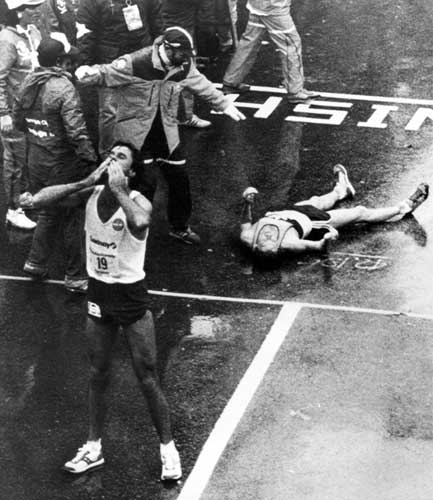Dixon hungry for another bite of cherry in Big Apple
After 25 years, the old desire is still there for New York icon. By Simon Turnbull

Your support helps us to tell the story
From reproductive rights to climate change to Big Tech, The Independent is on the ground when the story is developing. Whether it's investigating the financials of Elon Musk's pro-Trump PAC or producing our latest documentary, 'The A Word', which shines a light on the American women fighting for reproductive rights, we know how important it is to parse out the facts from the messaging.
At such a critical moment in US history, we need reporters on the ground. Your donation allows us to keep sending journalists to speak to both sides of the story.
The Independent is trusted by Americans across the entire political spectrum. And unlike many other quality news outlets, we choose not to lock Americans out of our reporting and analysis with paywalls. We believe quality journalism should be available to everyone, paid for by those who can afford it.
Your support makes all the difference.It's a printed picture that distils a thousand words. In reviewing the past quarter of a century of world sport, ABC Television in the United States called it "the image that reflects the thrill of victory and the agony of defeat".
The scene is Central Park and the immediate aftermath of the New York City Marathon on 23 October 1983. Rod Dixon, having snatched victory in the final 385 yards, is kissing his hands and about to raise them to the heavens in exultation. Geoff Smith, who led from the 15-mile mark to the 26th, lies flat on his back in a trough of despair and exhaustion. Fred Lebow, the founder of the New York City Marathon, has an arm stretched out towards Smith like a boxing referee counting out a floored fighter.
The snapshot is not unlike that of Muhammad Ali's celebrated moment of victory against Sonny Liston at Lewiston in 1965, only the knockout blow on that occasion came after one minute and 40 seconds; in New York in 1983 it came after more than two hours of pounding the streets of the city's five boroughs at close to world-record pace.
"I've got a copy of the picture here," Dixon said from his office in Los Angeles with the 25th anniversary fast approaching of the New Zealander's epic tussle with Smith, the one-time Liverpool fireman who also came to settle in the US. "A New Zealand artist rendered the image into a painting for me and I use it for the kids' running programme that I organise, with the motto 'Finishing is winning... winning is finishing'. It's amazing; it's been 25 years and that picture still seems to inspire people. I've always said to Geoff Smith: 'If it wasn't for you, that image wouldn't have been possible. It would have been just another finish'."
As it is, a quarter of a century on, Dixon is getting ready to return to New York as a hero. Rightly so. He was one of the three musketeers of New Zealand middle- and long-distance running who emerged in the 1970s, alongside John Walker and Dick Quax, who respectively won 1500m gold and 5,000m silver at the 1976 Olympic Games in Montreal. Dixon, who won Olympic 1500m bronze behind the Finn Pekka Vasala and Kenya's Kip Keino in Munich in 1972, showed the remarkable range of his talent when he closed a half-mile gap over the last 10 miles to overhaul the tiring Smith and become the first overseas winner of New York's marathon.
Now 58, he is preparing for another bite at the big race in the Big Apple. On 2 November he will run in the ING New York Marathon alongside one of his daughters, Emma, 29. "It will be an amazing experience for me to run the marathon with Emma," Dixon said. "I still love to run. I don't have to win or be the fastest. I just like to go out and connect with the emotional, physical and spiritual part of running."
The rough target time for Dixon and his daughter, a marathon debutant, will be around 3hr 40min. His winning time in 1983 was 2hr 8min 59sec, which still stands as a New Zealand record. Smith's consolation as runner-up was a British record, 2hr 9min 08sec. Now 55 and working as a special education teacher at Mattapoisett in Massachusetts, he still runs occasionally but for only five minutes. "I had a hip replacement nine years ago," he said. Naturally, his recollection of that finish in 1983 is not quite as sweet as Dixon's. "I'd spent all my energy," he reflected. "Once I crossed the line the difference between winning and losing was night and day. Yes, it is a great picture, but unfortunatelyI'm the one on the receiving end."
Still, after that debut at the 26.2 mile distance, Smith picked himself up off the floor and won the Boston Marathon in 1984 and '85. He was one of the great British distance runners of the time, when Dixon would pitch up from the other side of the world to mix it with the best, beating Dave Bedford in the English Cross Country Championship race in 1973 and Brendan Foster in a memorable 5,000m at the Gateshead Games in 1975.
Smith fondly recalls the days when he would "work all night as a fire-fighter, rush home, jump into bed at 9.15am and tell my father to wake me up at noon to drive to Bolton or Wigan to run a road race". Sadly for Britain, they don't make 'em the Alf Tupper way any more.
Join our commenting forum
Join thought-provoking conversations, follow other Independent readers and see their replies
Comments